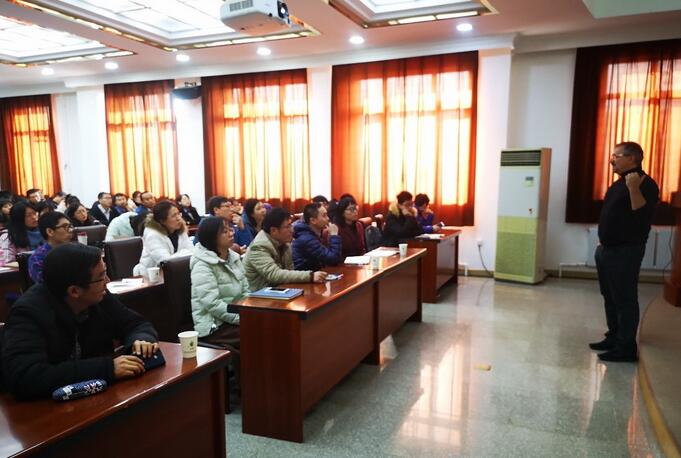On November 23, 2018, at the invitation of Prof. Edith BAI and associate Prof. WANG Chao from the Youth Innovation Promotion Association of the Institute of Applied Ecology (IAE), the Chinese Academy of Sciences and the Biochemistry Group of IAE, Professor Andreas Richter of the University of Vienna, Austria, paid an academic visit to IAE.
In the morning, Prof. Richter gave a talk entitled “the microbial perspective of soil carbon and nutrient cycling” in the meeting hall on the fourth floor of the ‘North Building’. Prof. Richter outlined the development history, technical characteristics and the application fields of oxygen isotope technology for measuring the utilization efficiency of microbial carbon. He also, according to his article recently published in Nature Climate Change, demonstrated that how microbes in response to simulated warming affect the turnover of soil carbon pools by changing nutrient use efficiency. The talk, presided by Prof. BAI, attracted approximately 100 attendees from IAE and other institutes, including Prof. FANG Yunting, the deputy director of IAE. A number of researchers and graduate students exchanged ideas with Prof. Richter on relevant scientific issues after his talk.
In the afternoon, Prof. Richter, accompanied by associate Prof. WANG Chao, visited the laboratories of Biogeochemistry Group and gave valuable advice on the construction and routine maintenance of the laboratory. Then he and the researchers and graduate students of Biogeochemistry Group conducted in-depth discussions on research projects of this group. Prof. Richter listened to the graduate students’ work reports, answered their questions and exchanged ideas on the future research cooperation with the group members.
Professor Richter has long been committed to researches on soil microbial community and soil carbon cycling, especially focusing on the regulation roles of microbes on soil carbon turnover under global warming conditions. In recent years, by using oxygen isotope technology, he for the first time determined the in situ microbial carbon utilization efficiency. He served as the chief scientist of the Austrian Microbial Genome Project and the chief scientist of the Austrian Polar Research Center. He is the editor of the journal Biogeoscience. He has published more than 180 SCI articles to date in top international journals such as Nature, Science, and PNAS. The total citation (ISI Web of Knowledge) is over 9000.
